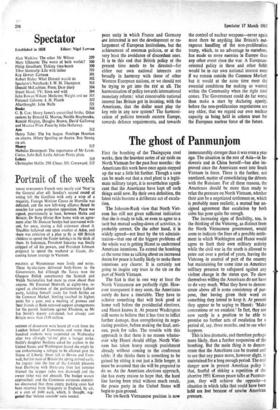Britain and the new Europe
`Wilson sure de Gaulle will say yes' ran the startling headline splashed across the front page of the first edition of last Sunday's Observer, above the name of that news- paper's well-informed political correspondent. By the later editions second thoughts had reduced the story to a few inches buried away on one of the inside pages, beneath the rather different legend, 'Wilson hopes for yes from de Gaulle.' But, alas, it was the early edition that found its way to the con- tinent and in particular to the Konigswinter conference across the Rhine from Bonn, where the German delegates, reading over their British opposite numbers' shoulders, shrugged their own at yet another demon- stration of Britain's growing isolation from `. the realities of the new Europe. A bizarre incident, unimportant in itself, but sym- bolising all too aptly the unhappy truth that, at a time when she is on the brink of apply- ' ing for membership of the Common Market, this country has not since the 'thirties been more out of touch with the forces at work on the continent.
Wow that General de Gaulle has acquired, if with some difficulty, the luxury of a par- liamentary majority to see him through the next five years, these forces are likely to con- tinue unimpeded. Unless the Government makes some effort to understand them, it will not only fail in its present attempt to join the EEC—this is now in any case as sure as anything in politics can be—but it will not even comprehend why it has failed, the essential prerequisite of any successful third attempt. movement towards European unity, for with- out her it will be impossible to build a Europe strong enough to avoid complete political and economic domination by the United States— that is, assuming. that Britain wishes to avoid such domination, which at the present time is far from clear. For Germany, too, there are other reasons for welcoming eventual British entry : the possibility of an Anglo- German alliance to bring an end to the state of affairs in which every Common Market quarrel resolves itself into a Franco-German confrontation in which Germany is regularly worsted; and the chance of regaining the traditional Scandinavian markets which she sees gradually slipping away from her as Britain's Efta trade increases.
But all this is in the very long run. Whether or not Mr Wilson intends to get into Europe `at a hell of a pace,' France and Germany are in no hurry at all. Once upon a time they were; but then it was Britain that was dilatory and hesitant. Today European integration in the institutional sense has fallen low down the list of continental priorities. Both France and Germany have more immediate fish to fry, and to this end the Franco-German treaty of friendship is more useful politically than the treaty of Rome. The Adenauer-de Gaulle love match between the countries was soon over; but after the estrangement that ended with the fall of the unhappy Erhard it has been succeeded by a cold-blooded marriage of convenience, with few illusions on either side. Such liaisons, however unromantic, can be more enduring if the convenience is real enough; and this one is. course for Europe, under French leadership if possible, to follow: establishing its creden- tials as an independent force in the world by shaking free of the American embrace— whether by walking out of and permanently crippling NATO or by attacking the power of the dollar—and by cultivating improved rela- tions with the communist countries of east- ern Europe, for whom the economic success of the Common -Market is becoming increas- ingly alluring. For Germany, France's inde- pendent. policy of détente provides at the very least a fig-leaf of respectability behind which the new German government can attempt to restore its country's historical links with eastern Europe and ultimately find a solu- tion to the German problem which the old alliance with America so signally failed to do. pean unity in which France and Germany are interested is not the development or en- largement of European institutions, but the achievement of common policies, or at the very least the avoidance of discordant ones. It is to this end that British policy at the present time needs to be directed—for either our own national interests are broadly in harmony with those of other Western European nations, or we should not be trying to get into the En at all. The harmonisation of policy towards international monetary reform: what conceivable national interest has Britain got in insisting, with the Americans, that the dollar must play the key role in any new system? The harmoni- sation of policies towards eastern Europe, towards defence requirements, and towards the control of nuclear weapons—never again must there be anything like Britain's out- rageous handling of the non-proliferation treaty, which, to no advantage to ourselves, has made us more enemies in Europe than any other event since the war. A European- oriented policy in these and other fields would be in our own national interest even if we remain outside the Common Marker; but it would at the same time meet the essential conditions for making us wanted within the Community when the right time comes. The Government could do far worse than make a start by declaring openly, before the non-proliferation negotiations are any older, that we regard our own nuclear capacity as being held in solemn trust for the European nuclear force of the future.































